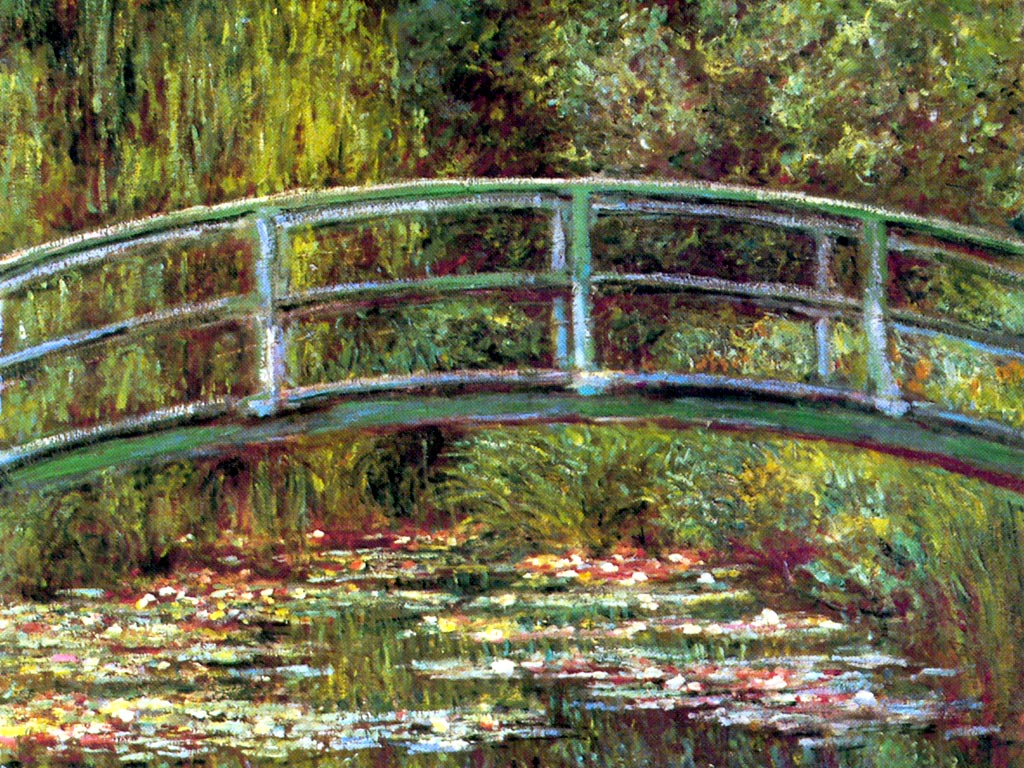
Midsummer August prompts a vision of Claude Monet’s gardens at
Giverny, his French country villa, vibrant and shimmering in the summer sun. The
impressionist was an avid horticulturist whose paintings of the gardens which he himself designed and planted [with the help
of five hired gardeners] left a legacy unequalled. He wanted the world to see
and know the magic and beauty of nature that he had found in his flowers. Admirers of Monet know his first love was gardening.
Let these quotes of Monet savor in your imagination: “Everyone discusses
my art and pretends to understand, as if it were necessary to understand, when it is simply necessary to love.” “I
must have flowers, always, and always.” “Color is my daylong obsession, joy, and torment.” “It's on
the strength of observation and reflection that one finds a way. So we must dig and delve unceasingly.” “The richness
I achieve comes from nature, the source of my inspiration.” “I can only draw what I see.” “I perhaps
owe having become a painter to flowers.” “The more I live, the more I regret how little I know.” “My
garden is my most beautiful masterpiece.” “If the world really looks like that I will paint no more!” Pondering Monet, my own small flower garden is a benediction renewed....acg

Monet incorporated the Japanese garden bridge in his montage. And painted it apple green to match the shutters
on his villa.

The best argument for Christianity is Christians: their joy, their certainty,
their completeness. But the strongest argument against Christianity is also Christians--when they are sombre and joyless,
when they are self-righteous and smug in complacent consecration, when they are narrow and repressive, then Christianity dies
a thousand deaths. But, though it is just to condemn some Christians for these things, perhaps, after all, it is not just,
though very easy, to condemn Christianity itself for them. Indeed, there are impressive indications that the positive quality
of joy is in Christianity--and possibly nowhere else. If that were certain, it would be proof of a very high order.―
Sheldon Vanauken, A Severe Mercy

I don’t know that I ever aspired to greatness, but these days,
thank goodness, I can be a little fellow in the wide, wide world, and stay close to home. I can love those nearby and leave
the salvation of the world to those who are younger, stronger, brighter and better at it than I. I’ve wondered at times
if I’ve gotten slothful; I rather think I’ve just gotten old. An
aging friend wrote to me the other day bewailing her loss of opportunity. Publishers no longer clamor for her manuscripts;
churches no longer call on her to speak. She’s trying to adjust, she said, to a snail-like pace of life. “Thank goodness,” I wrote in reply. “More time now to love and to pray; more time for
reading and contemplation; more time to develop intimacy with Jesus and with our other friends; more time to enjoy our Lord’s
presence in creation; more time for ordinary duties; more time for common things.” J.R.R. Tolkien

“I sought for America’s greatness. I found it not in her fields and forests. I found it not in
her mines and factories. I found it not in her Congress and great tribunals. It was only when I entered her pulpits thundering against sin and preaching righteousness
that I discovered her greatness. America is great because America is good. If America ever ceases to be good, America will cease to be great.” Alexis de Tocqueville, French philosopher, in his book, Democracy in America, 1831.


